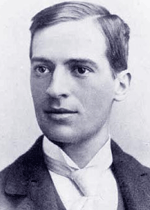Pillsbury Harry Nelson (05.12.1872 – 17.06.1906)
 American chess player and chess theorist. One of the strongest chess players from the end of the nineteenth to the beginning of the twentieth centuries.
American chess player and chess theorist. One of the strongest chess players from the end of the nineteenth to the beginning of the twentieth centuries.
A professional chess player, he edited chess columns in American newspapers. He began to play chess at the age of 16. He moved to Boston to study commerce and spent much time playing draughts, whist and chess. in 1893 he defeated Walbrodt with a score +2=1 and so his professional chess career began. After the victory in the Championship of “Manhattan Chess Club”, he got the right to represent the USA at the Hastings Tournament 1895, where he showed his best result having won the first prize and scored 16,5 out of a 21 possible followed by the strongest players of that time: Lasker, Tarrasch, Tchigorin and Steinitz.
After this tourney, Tarrasch said that the success of Pillsbury was extraordinary; moreover, he took part in such a great tournament for the first time. He said that Pillsbury was a chess player of genius and his play was full of deep ideas.
Alfred Emery, a chess player, and a journalist, wrote that “Pillsbury’s best combinations were made with apparently little trouble. An inveterate smoker, often consuming a dozen cigars without pause, he would, when working out some particular combination, send a cloud of smoke among the pieces. Then, tilting his chair like an American rocker, he would sum up, as it seemed, the wider progress of the game, himself often the coolest of the company.” The victory at the Hastings Tournament gave him a chance to play at the St. Petersburg match tournament but his performance there was not stable due to his illness and finally, he took only the third place. Nevertheless, he won an individual match against Lasker and beat him with a score 3,5-2,5, and Tchigorin with a score +3=1-2, but lost to Steinitz scoring =2-4. He continued to play successfully in various chess events, but he never again achieved the same level like at Hastings.
In 1896 he played at Nuremberg where he shared third place with Tarrasch behind Lasker and Maroczy and at Budapest where he was the third behind Tchigorin and Charousek. In 1898 at Vienna he shared the first-second places but lost the match for the first prize to Tarrasch with a score +1-2=1. Pillsbury played at London in 1899 where he was equal second with Maroczy and Janowski behind Lasker.
In 1900 he performed second at Paris after Lasker and shared 1-3 places at Munich together with Maroczy and Schlechter where he drew a play-off match for the first-second places with Schlechter. In 1902 he was the second at Monte Carlo after Maroczy and Hanover behind Janowski, the next year at Monte Carlo he was the third behind Tarrasch and Maroczy, and the fourth at the Vienna King’s Gambit Tournament In 1901 he married in Philadelphia and settled there. Only once in 1904 at the Cambridge Springs Tournament; he did not take any prize being very ill, but he drew an individual game with Lasker.
Until the very end of his life, he remained the US Champion as he won two matches against Showalter, the first one in 1897 with a score +10-8=3 and in 1898 with a score +7-3=2. He became the winner of the 1901 Buffalo National Master Tournament.
In the period 1894-1906 he participated in four national and 13 international tournaments, having played 312 games with a total score +172, -63, =77. In general, he played six matches with a total score +31-19=14 and lost only one to Tarrasch.
He was an outstanding master of blindfold exhibitions, performing in the period 1898-1904 in 40 displays and winning 666 games with a score +456-75=135. In 1901 for seven months he played in 150 blindfolds. In 1902 he traveled to Russia and played 22 simultaneous blindfold games versus the strongest Moscow chess players, and his display ended with a score of +17-1=4 in his favor. Pillsbury was a chess player of universal style, known for his research in the Queen’s Gambit and Spanish openings, being a keen strategic player.
The tragedy of his short life was that Pillsbury contracted syphilis in St. Petersburg in 1895-96 and was not well during 1896; he then recovered, but in 1903, he succumbed to the disease again and was seriously ill in 1904.



